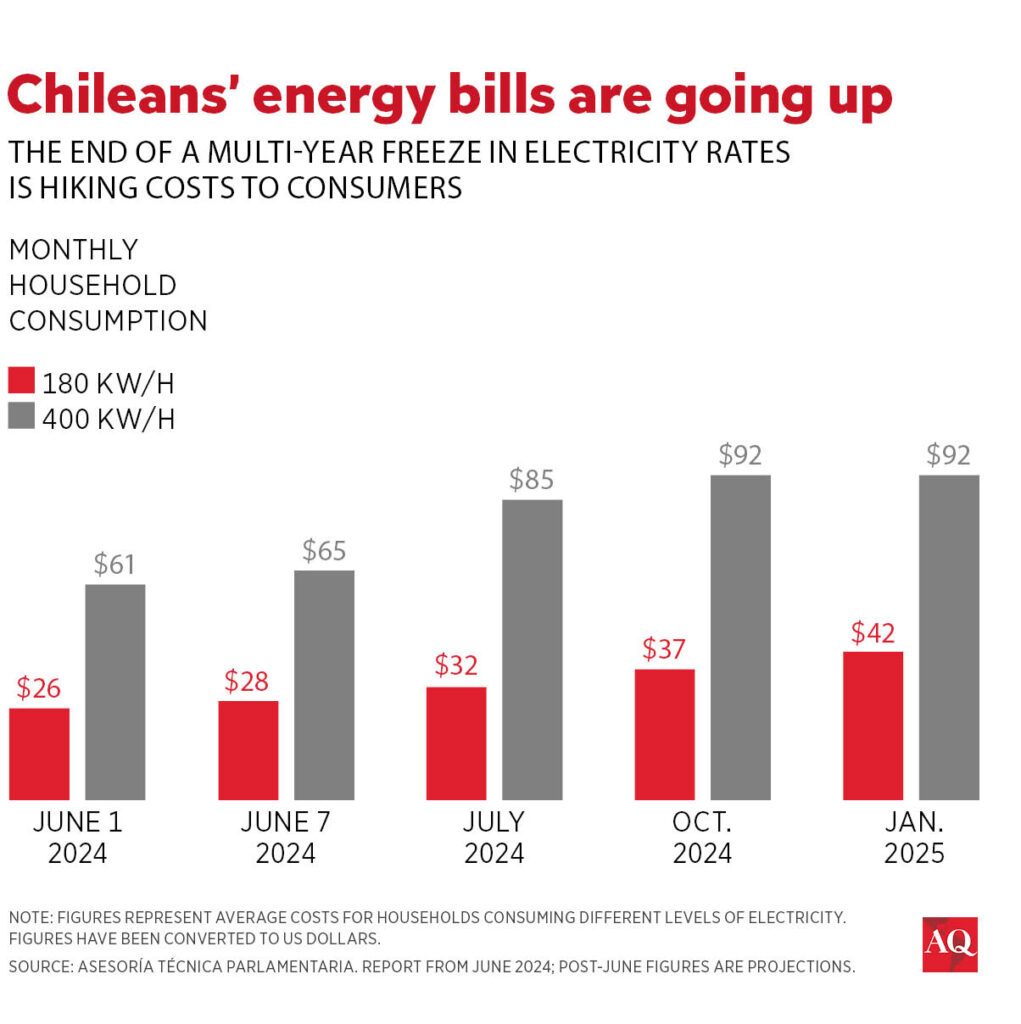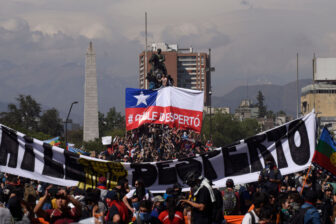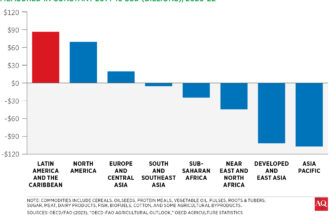SANTIAGO – Five years ago, after mass protests broke out over a rise in transport fares in Chile’s capital, President Sebastián Piñera made a little-noticed decision he hoped would prevent further social unrest: freezing a planned increase in electricity rates.
But as time went on and Chile went through a presidential election in 2021 and two failed attempts at writing a new constitution, this short-term, politically-minded decision—unusual for Chile’s generally technocratic methods of deciding on electricity rate adjustments—became a costly ongoing policy. Successive governments prolonged the delay in rate hikes, creating a debt that has reached unsustainable levels, exceeding $6 billion (2% of Chile’s GDP).
Now, with the passage of a law unblocking the rise in electricity prices, the burden is falling on the shoulders of everyday Chileans, through higher electricity bills, reduced business productivity and competitiveness, and other ripple effects.
It’s a stark warning of the heavy price of politically motivated economic policies—and one that carries lessons for the rest of Latin America. Political leaders across two administrations avoided addressing the looming financial consequences of these freezes. In regions like Latin America where subsidies and price controls are employed to maintain public support, economic misalignments like these often remain unaddressed until they escalate into crises. Chile’s electricity rate saga serves as a warning to policymakers across the region to balance short-term political gains against the risks of accumulating hidden economic imbalances.

The making of a debacle
The electricity rate saga began in October 2019, when a 30-peso hike in public transport fares triggered widespread public unrest in the country. A 9.2% increase in electricity rates was planned at that time, but to avoid further exacerbating social tensions, President Sebastián Piñera’s government froze electricity costs to consumers.
Piñera’s government implemented the rate hike freeze through the Energy Price Stabilization Law, postponing the adjustment of electricity rates until 2020. This law established a consumer debt ceiling with power generation companies of $1.35 billion, to be paid between 2025 and 2027. The Chilean government essentially capped electricity prices for consumers, promising to repay power generating companies for the difference. But no immediate government outlay covered this gap; instead, it was treated as deferred debt to be repaid through future rate hikes for consumers.
What began as a pragmatic, short-term measure became an ongoing policy, coinciding with key political processes such as the 2021 presidential elections and two failed attempts to draft a new constitution. Political reasons outweighed technical and economic considerations.
The freeze was extended in 2022 under the administration of President Gabriel Boric, who took office in March 2022, through a new law that added $1.8 billion to the debt ceiling and extended the repayment period to electricity generators until 2032. This decision came at a time when the country was preparing for a key referendum on a new constitution, and was aligned with the president’s campaign promises of social equity and redistribution, aiming to shield lower-income households from a sudden tariff increase.
Finally, on April 30, 2024, the government passed a law to unfreeze rates, which set the framework for consumers to pay their unsolicited debt to power producers in installments through their electricity bills. Between June 2024 and January 2025, tariffs could increase by up to 60%, with the increases potentially remaining for a decade.
Now, the bill has come due. Price hikes will add 1.5% to inflation in the first year and will have immediate consequences for business productivity, disrupt trade, and lower citizens’ quality of life. Payment to power companies will come from the consumers via tariff increases that will extend for over a decade from 2024 onward. The accumulated debt’s financial burden is effectively transferred to consumers rather than being absorbed by the government budget.
Chile has attempted to ease the burden on consumers of increased rates by providing electricity subsidies. Initially, 1.6 million households benefited, and now there’s an effort to expand the subsidy to 4.7 million households, reaching the 40% most vulnerable population segment. However, these subsidies will not be financed by eliminating inefficient public spending but by further shifting the burden to other specific sectors, such as large energy consumers and small distributed energy generators. The uncertainty created by Chile’s debt and freeze policies, along with an intended subsidy scheme covering 40% of the population, has raised investor concerns about the predictability and stability of the country’s energy sector. This increasingly volatile and politicized approach to energy debt repayment may deter future investment.
A tangible lesson on what not to do in electricity policy
This case is a clear and tangible example of the costs that inadequate public policies impose on citizens. After years of inaction, the impact has become starkly visible: We see it reflected in the electricity bills we will pay over the next decade. Month by month, consumers will remember the political instability and violence that shook the country in October 2019, as well as the funding and delayed decisions that followed.
Examples of similar policy decisions taken in the region are common. Argentina’s experience with subsidized energy prices is especially instructive. In the early 2020s, the government maintained artificially low natural gas and electricity prices, creating significant budgetary strains as subsidies soared to sustain these levels. While this approach temporarily relieved inflation, it ultimately necessitated costly fiscal interventions and sharp tariff adjustments, which fueled public discontent.
Although initially, they can go unnoticed, the consequences of unwise policies silently spread across society, profoundly impacting institutions and public services while undermining the country’s development potential. Poorly managed resources and hasty or politically motivated decisions, while often overlooked at first, gradually erode trust in the system and cripple both national progress and citizens’ welfare.
It’s time for the silence surrounding unwise public policies to end, and for citizens to demand more responsible and sustainable decisions. If we fail to act, the consequences of these errors will continue to impact citizens’ daily lives, as we’ve seen in Chile’s rising electricity bills. This Chilean experience should serve as a wake-up call for the entire region, tangibly highlighting the immense cost of inaction and political short-sightedness in managing essential public services.









